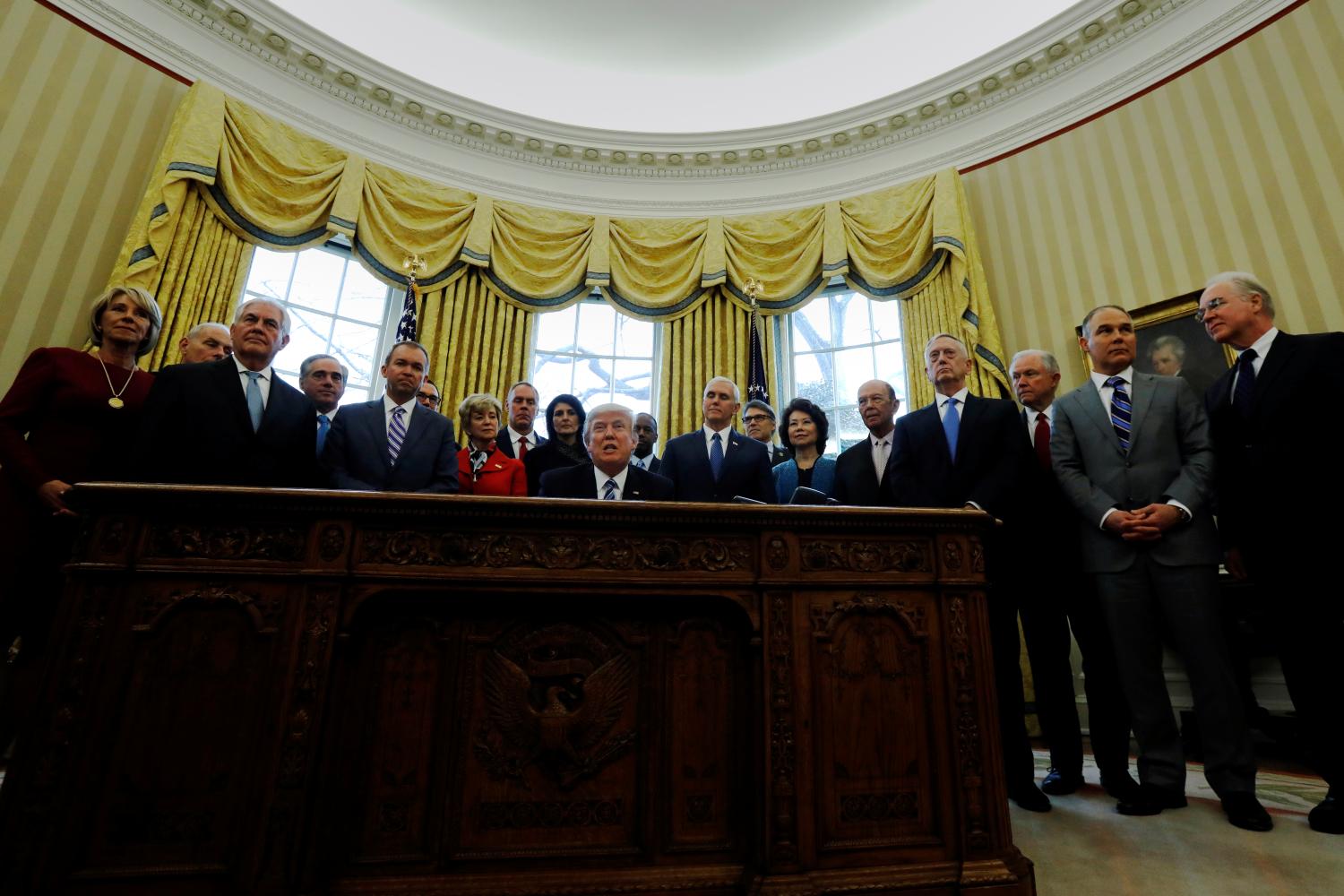This week, the U.S. Senate will consider President-elect Donald Trump’s nominee to become the 84th Attorney General of the United States. Jeff Sessions is no stranger to the Senate, having represented Alabama in the chamber for the last 20 years. Often, confirmation hearings for sitting senators are cordial affairs, if not formalities. However, as my colleague Tom Mann points out, Sessions’ checkered history and ideological position in the Senate could mean some pointed, difficult questions from Judiciary Committee Democrats, and perhaps a Republican or two.
The powers and duties that the Attorney General is charged to carry out will motivate much of the conflict that could play out Tuesday and Wednesday during the confirmation hearing. The Attorney General is the chief law enforcement officer and chief lawyer in the United States. As part of this, the Attorney General is the President’s enforcer. It is this context in which Jeff Sessions will have the power to reshape public policy in the United States in dramatic ways.
The Justice Department is a vast institution with over 100,000 employees spread among numerous, critical offices, agencies, and bureaus. As Attorney General, Jeff Sessions will oversee all of them. That makes the position both powerful and prone to controversy. Oftentimes, as important as what the Attorney General seeks to enforce is what he or she chooses not to enforce. That means criminal investigations—carried out by FBI, DEA, ATF, and elsewhere—can be influenced by the AG. In addition to criminal investigations, the Attorney General plays a role in setting the tone of law enforcement in the United States and offering advice to state, county, and municipal law enforcement agencies on how to deal with challenges in the community. As conflicts have arisen in communities around police conduct and community policing, Attorneys General Holder and Lynch worked hard to build bridges and overcome those challenges. However, they did not solve the problems, and those problems are not going away. Senators will expect Sessions to address how he, as AG, will address those community conflicts.
The Attorney General also oversees the Solicitor General, who most notably represents the United States in its most high-profile legal disputes: those that are heard before the U.S. Supreme Court. During a transition of power from one party to another, this role is critically important. Not only can the Solicitor General defend the U.S. in a case; he or she can “choose” not to defend the U.S.—as the Obama administration did in the case challenging the Defense of Marriage Act. The Attorney General can instruct the Solicitor General not to defend the U.S. in cases in which the new administration disagrees with or opposes a law, regulation, executive action or other administrative act. As cases against Obama administration-enacted policies percolate through the federal courts, the Sessions hearing will likely engage whether, as AG, he will opt not to defend the government. Such actions could mean serious shifts in policy around the environment, labor, energy, and many other issues even including the power of the president.
In addition, the Attorney General oversees federal prosecutors—United States Attorneys. U.S. Attorneys serve at the pleasure of the president, but are part of the Justice Department and take orders and guidance from the AG and his deputies. Prosecutors have tremendous discretion over which cases are pursued, the manner in which they are pursued, the types of plea agreements that are entertained and the sentences that are advocated for. Prosecutorial discretion can also have meaningful policy effects. For example, immigration policy can be affected by the manner in which U.S. Attorneys prosecute immigration laws and violations. During the Obama administration, the Deferred Action Program (DACA) succeeded because of cooperation between Homeland Security’s Customs and Border Protection and the U.S. Attorneys. Senate Democrats who support DACA, comprehensive immigration reform, and other changes to the nation’s immigration system will surely have fierce questions for Sessions—an avowed immigration reform opponent—about his intentions in this area.
Another area in which the leadership of the Justice Department, in concert with the U.S. Attorneys, has significant power is marijuana policy. As Donald Trump takes the oath of office on January 20, 28 states and D.C. will have approved comprehensive medical marijuana programs and 8 states and D.C.—composing 20 percent of the US population—will have approved adult-use marijuana programs. While those state-level systems explicitly contradict federal law, they have been allowed to continue to exist because of a memorandum from the Justice Department, known as the Cole Memo. The Cole Memo will remain in place until the Justice Department issues a superseding order. Sessions is as much of a hard-line marijuana opponent as one can find in the U.S. Senate, and it should be expected that Senate Democrats will query his interests in reversing the Cole Memo, disrupting state-level systems, and enforcing against state officials, industry actors, patients, and consumers.
The Attorney General also plays a crucial role in enforcing civil rights and equal treatment in the United States. The Civil Rights Division of the Justice Department is one of the most important institutions in government, particularly for groups at risk of discrimination because of race, ethnicity, religion, gender, age, disability, etc. The Obama administration has both worked hard to ensure that this institution was robust in its defense of those groups and to seek to expand what falls under the umbrella of a protected group and a civil right. Those definitions and the manner in which the law is enforced with regard to such protections differ along the ideological spectrum. Democrats, and particularly Judiciary Committee progressives, will take seriously the charge of this division and drill into Sessions’ views with regard to the Justice Department’s role and how he would go about assisting protected classes. Particularly given the concerns around Sessions’ views on race that tanked his 1986 judicial nomination, Senators are sure to probe the manner in which he would oversee the Civil Rights Division and influence its chief: the Deputy Assistant Attorney General for the Civil Rights Division.
Finally, the Attorney General plays a critical role in protecting voting rights in the U.S. In an era in which some states are making it harder for people to vote, restricting the number of voting machines, or the opportunities individuals have to vote, the Attorney General’s role is a high-profile one. The Justice Department investigates claims of voter disenfranchisement or intimidation and can also litigate against states that draw congressional district lines that are inconsistent with the Constitution and/or the Voting Rights Act. While the 2013 Shelby County case diluted significant parts of the Justice Department’s power with regard to the Voting Rights Act, its powers remain critical to free and fair elections across the nation. As Tom Mann noted earlier today, Sessions’ controversial prosecution of individuals seeking to register black voters was part of the reason the Republican-controlled Judiciary Committee rejected his 1986 judicial nomination. That scandal and Sessions’ views of the Justice Department’s role in protecting voting rights will be a crucial part of his hearing and may well determine how many of his fellow Senators vote on his nomination.
The likelihood of Sessions nomination being rejected by the GOP Senate is slim, barring some shocking skeleton in his closet—an unlikely situation for a man who has been a public official for so long. However, his confirmation hearings will highlight two important items. First, many people fail to understand how comprehensive the jurisdiction of the Department of Justice is and as such, how much power the Attorney General yields. This week’s hearing will remind Americans of the scope of those duties. Second, this hearing will, for the first time, reveal Jeff Sessions’ views on those duties and allow Senators and the public to understand how he plans to run the nation’s highest ranking law enforcement entity.
If confirmed as the 84th Attorney General, Jeff Sessions will become one of the most important and powerful individuals in the United States. There is no question that Sessions will use that position to enact dramatic changes to public policy and law enforcement in this nation and his confirmation hearings will be the first glimpse into the types of changes he will seek.
The Brookings Institution is committed to quality, independence, and impact.
We are supported by a diverse array of funders. In line with our values and policies, each Brookings publication represents the sole views of its author(s).



![For USA-ELECTION/VOTING-NORTHCAROLINA [moving at 0600 EDT (1000 GMT) Friday, July 15, 2016]A pile of government pamphlets explaining North Carolina's controversial "Voter ID" law sits on table at a polling station as the law goes into effect for the state's presidential primary in Charlotte, North Carolina, U.S. on March 15, 2016. REUTERS/Chris Keane/File Photo - RTSI0CT](https://www.brookings.edu/wp-content/uploads/2017/01/gs_20170123_nc-voter-id.jpg?quality=75&w=500)




Commentary
Confirming Team Trump: Interrogating the President’s ‘enforcer’
January 9, 2017